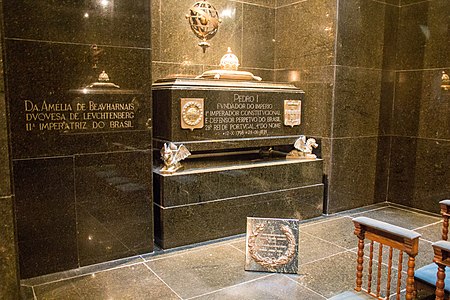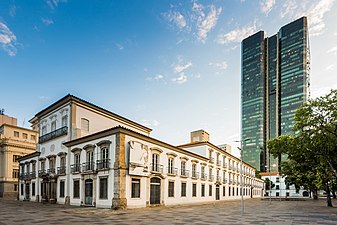Brazilian imperial family
The Imperial House of Brazil (Brazilian Portuguese: Casa Imperial Brasileira) is a Brazilian dynasty of Portuguese origin that ruled the Brazilian Empire from 1822 to 1889, from the time when the then Prince Royal Dom Pedro of Braganza (later known as Emperor Pedro I of Brazil) declared Brazil's independence, until Dom Pedro II was deposed during the military coup that led to the Proclamation of the Republic in 1889.
Brazilian imperial family
Família imperial brasileira
House of Braganza-Brazil
House of Brazil
House of Brazil
House of Aviz by the way of the House of Braganza
1822
Vassouras branch:
Prince Bertrand of Orléans-Braganza
Petrópolis branch:
Pedro Carlos Orléans-Braganza
Brazil
1889
The members of the family are dynastic descendants of Emperor Pedro I. Claimants to headship of the post-monarchic Brazilian Imperial legacy descend from Emperor Pedro II, including the senior agnates of two branches of the House of Orléans-Braganza; the so-called Petrópolis and Vassouras lines.[1] Prince Pedro Carlos of Orléans-Braganza (born 1945) heads the Petrópolis line, while the Vassouras branch is led by his second cousin, Bertrand of Orléans-Braganza.[2]
Rivalry within the family erupted in 1946 when Dom Pedro Gastão (1913–2007) repudiated the renunciation to the throne of his late father, Pedro de Alcântara, Prince of Grão-Pará (1875–1940), for himself and his future descendants, when he made a non-dynastic marriage in 1908.[2] Pedro de Alcântara was the eldest son of the Princess Imperial Isabel (1846–1921) who, as Pedro II's elder daughter and heir presumptive when he was dethroned, became the last undisputed head of the family after her father's death in exile in 1891.[2] Pedro Carlos is Dom Pedro Gastão's eldest son. Dom Bertrand descends from Isabel's younger son, Prince Luís (1878–1920) who, by a Bourbon princess, fathered Prince Pedro Henrique (1909–1981). Dom Bertrand is Pedro Henrique's son by a Bavarian princess and upholds his dynastic claim to the same legacy.[3]
Following the tradition of the Portuguese monarchy, itself abolished in 1910, the closest relatives of the Brazilian emperor are considered members of the Brazilian imperial family.
The Empire of Brazil remained a constitutional monarchy until 1889 – when the republic was proclaimed after a military coup d'état, and had two reigning emperors, both from the House of Braganza:
Their full style and title were: "His Imperial Majesty, Constitutional Emperor and Perpetual Defender of Brazil".














